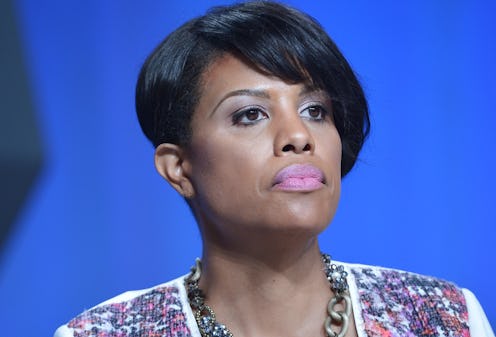News
Baltimore's Mayor Has A Long History In Politics
Following multiple days of deliberations, the trial of William G. Porter was declared a mistrial as the jury could not reach a unanimous decision on the four charges against the Baltimore officer. Porter is the first of six officers set to be tried in the death of Freddie Gray. Immediately issuing a statement standing by the judge's decision, Baltimore Mayor Stephanie Rawlings-Blake called for peaceful demonstrations in response to the ruling. Rawlings-Blake previously came under fire for her handling of violent protests following Gray's death in April, and her support for peaceful demonstrations sends a strong statement and shows her connection to the community.
The Baltimore mayor has been in local politics for more than two decades, first serving as a public defender before being elected to city council in 1995. It was her father, Howard "Pete" Rawlings, who served as the city's delegate in the Maryland House of Delegates from 1979 until his death in 2003, that helped get Rawlings-Blake interested in politics. Her father was known for his outspokenness and advocacy of education opportunities, as well as his dedication to helping to make a responsible budget for the state, having served as the chairman of the state's House Appropriations Committee. The two were incredibly close and Rawlings-Blake even volunteered for his campaign as a kid. She would subsequently influence him and get him to support current Democratic presidential hopeful Martin O'Malley in his successful Baltimore mayoral bid in 1999.
O'Malley served as mayor until 2007, when he was elected governor of Maryland. City Council President Sheila Dixon subsequently assumed the role of mayor, and the city council voted for Rawlings-Blake to succeed her. Dixon would go onto resign as mayor as part of a plea deal regarding charges against her, including embezzlement and perjury. Rawlings-Blake became mayor in 2010 based off the same stipulation that elevated Dixon to the position. She was officially elected the very next year. Both Dixon and Rawkings-Blake are Democrats, thus continuing decades of left-leaning mayors presiding over Baltimore.
Though she is not seeking reelection when her term ends in 2016, Rawlings-Blake is nonetheless still very passionate about her city. For that reason, it's unsurprising that she would once again call on citizens to heal and demonstrate peacefully, placing her full faith in the city of Baltimore leading by example in the face of a hung jury.
Speaking at a press conference following the mistrial ruling, Rawlings-Blake had this to say:
If some choose to protest, they must peacefully demonstrate. That is their right. ... I urge everyone to remember that collectively our reaction needs to be one of respect for our neighborhoods, and for the residents and businesses of our city and for those who have answered the call to serve and protect.
We will not and cannot be defined by the unrest of last spring. As a city, as a community, we are stronger and we are united to be better than what some displayed to the world in the spring. For the past eight months, we have worked relentlessly to unite Baltimore with a resolve to have peace in our streets. We have a chance to show the country how to be heard peacefully, respectfully and effectively. I know that as a community we are up to the task.
Rawlings-Blake's role as mayor during this turbulent time may very well define her tenure. Recognizing the impact that Gray's death and its aftermath has had on the city of Baltimore, Rawlings-Blake explicitly stated that she wouldn't seek reelection so as not to distract from her many pressing duties while still serving as mayor.
